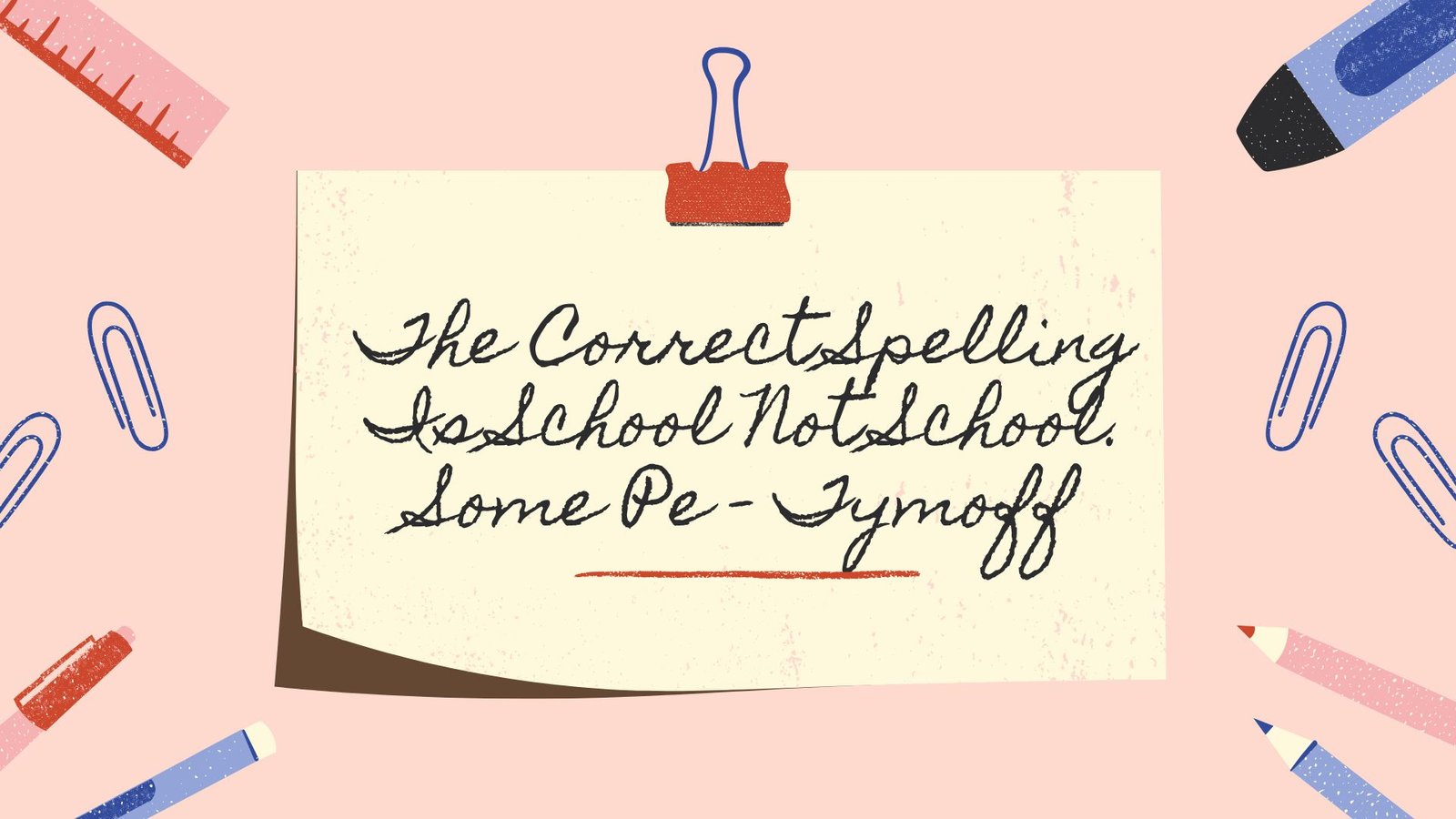The Correct Spelling Is School Not School. Some Pe – Tymoff
In today’s world of rapid communication, particularly online, spelling mistakes have become increasingly common. One such common issue is the confusion around the spelling of the word “school” and its variants. While it might seem like a small issue, understanding the correct spelling and usage of this word is crucial for clarity in communication. However, a deeper look reveals that there are some interesting nuances related to this topic. This article will focus on exploring the importance of correct spelling, specifically the word “school,” and how misunderstanding its spelling or context can impact communication. We will also explore a phrase like “some PE – tymoff,” which could be a misunderstood or misused term. Through this, we will discuss the broader implications of spelling and grammar mistakes in everyday communication and their impact on writing, both professionally and personally.
Also Read: Meet the Iconic Couple from the Woodstock Album Co – Tymoff
The Importance of Correct Spelling
Spelling plays an important role in written communication, especially in formal or academic settings. It serves as a fundamental pillar for establishing credibility, professionalism, and clarity. While we all make mistakes from time to time, consistently misspelling words can undermine the writer’s credibility and make their content difficult to understand. Take, for instance, the word “school,” which is often miswritten or misused due to variations in speech or typing errors. Whether in emails, essays, or official documents, spelling “school” correctly is important because it is such a frequently used term.
Spelling issues are a part of language learning and development, and many people make these errors unintentionally. However, in a world increasingly dependent on technology, spell-check tools and online dictionaries are more readily available than ever. It’s essential to leverage these tools and make an effort to avoid simple spelling mistakes that could potentially detract from the content’s effectiveness. The difference between “school” and a misspelled version of it could have significant consequences in terms of reader perception and comprehension.
Common Mistakes in the Spelling of ‘School’
The word “school” may seem straightforward, but it is often mistakenly spelled incorrectly by students and adults alike. Some common misspellings include “shcool,” “scool,” and “schoool.” These errors can be attributed to several factors. One major factor is the influence of regional accents, where pronunciation differs from standard written forms. Additionally, individuals who are typing quickly or using predictive text tools may make unintentional errors.
The confusion surrounding the word “school” also extends to its plural form, “schools.” This is because many people mistakenly add an extra “s” or drop the “s,” creating forms like “shools” or “schoos.” These kinds of errors are typical of those who are still honing their language skills or those who use non-standard typing or speech patterns. While these mistakes are forgivable in casual communication, it is important to remember that in professional and academic contexts, accuracy matters significantly.
One particular confusion arises with online communication, where informal or relaxed language becomes more prevalent. Since spelling is less scrutinized in casual settings, users of social media platforms or instant messaging services may spell “school” incorrectly without second thought. While this may be acceptable in informal contexts, it is always best to prioritize correct spelling when engaging in professional or formal communication.
Spelling Variations and Regional Differences
Language is not static—it evolves, and regional variations are inevitable. English is spoken around the world in various forms, which sometimes leads to differences in spelling and usage. For example, the British spelling of certain words differs from the American spelling. Words like “colour” (British) versus “color” (American) or “organise” (British) versus “organize” (American) are classic examples of regional spelling variations. The word “school” does not experience these regional variations in its spelling. However, the pronunciation of “school” may differ across various regions, leading to occasional misspellings influenced by local accents and dialects.
For instance, in certain regions, speakers may pronounce the “oo” in “school” as a more rounded sound, leading to the potential for spelling it as “schoool” or “shcool.” While these mistakes are generally harmless in informal settings, it’s still important to be aware of these variations, especially when writing in formal contexts, such as in academic or professional settings.
Also Read: Learn To Sit Back and Observe. Not Everything Need – Tymoff
The Role of Technology in Spelling
With the advent of technology, it has become easier than ever to ensure correct spelling. Word processors, like Microsoft Word and Google Docs, come with built-in spell checkers that catch most mistakes. However, these tools are not always perfect, and in some cases, they might miss errors, especially with homophones (words that sound the same but have different meanings) or regional spelling differences. Moreover, while these tools can correct basic spelling mistakes, they may not catch errors where the word is used in the wrong context.
For example, “school” might be incorrectly used in a phrase where another word would be more appropriate, such as “skool” or “schoole.” While spell checkers may flag these as mistakes, they will not always catch subtler errors like using “school” when a different term is required for the context. It’s important, therefore, to not rely solely on technology for spelling correction. The key is to develop an awareness of common spelling mistakes and practice good spelling habits.
PE and Tymoff: Understanding Misused or Misunderstood Terms
Another aspect of confusion arises when less common terms or abbreviations enter the conversation. The term “PE – tymoff” could be a misspelling or misinterpretation of certain words or phrases. “PE” typically refers to “Physical Education,” and “tymoff” could be an attempt to spell “time off” or another similar phrase.
In contexts like these, spelling and usage errors can significantly impact understanding, especially when trying to communicate something as important as a break or a specific type of lesson. “PE – tymoff” might cause confusion among readers or listeners, as they may not understand the term’s intended meaning.
When using abbreviations like “PE,” it’s important to clarify what the abbreviation stands for, especially if the audience may not be familiar with it. Similarly, with terms like “tymoff,” it’s essential to ensure that the intended meaning is clear and that the word is properly spelled.
Correcting Spelling and Improving Writing Skills
While spelling mistakes are common, the good news is that they can be corrected. Here are some practical steps you can take to improve your spelling and writing skills:
- Use Spell Check Tools: Leverage technology to help you identify spelling errors. This includes using built-in spell checkers in word processing software, as well as external tools like Grammarly or Hemingway Editor.
- Read Aloud: Reading your writing aloud can help you spot errors that you might not catch when reading silently. When you read aloud, you may notice when something sounds off or if a word is misused.
- Practice Spelling Regularly: Like any other skill, spelling improves with practice. Regularly writing and reviewing your work will help reinforce correct spelling patterns in your mind.
- Seek Feedback: Don’t be afraid to ask others to review your work. Whether it’s a friend, teacher, or colleague, fresh eyes can catch mistakes you might have overlooked.
- Review Commonly Misspelled Words: Focus on words that you frequently misspell and take the time to learn the correct spelling. Keeping a list of tricky words can be a helpful strategy.
Conclusion
Spelling is a crucial aspect of effective communication. Whether in professional or casual settings, the correct spelling of words, like “school,” is important for clarity and accuracy. By understanding common spelling mistakes and the potential for confusion, individuals can improve their writing skills and convey their messages more effectively. Additionally, understanding the importance of clear communication, including the correct usage of abbreviations and less common terms like “PE – tymoff,” ensures that content is not only well-written but also well-understood. With the right tools and strategies, improving spelling is a realistic goal for anyone committed to enhancing their writing.









Post Comment